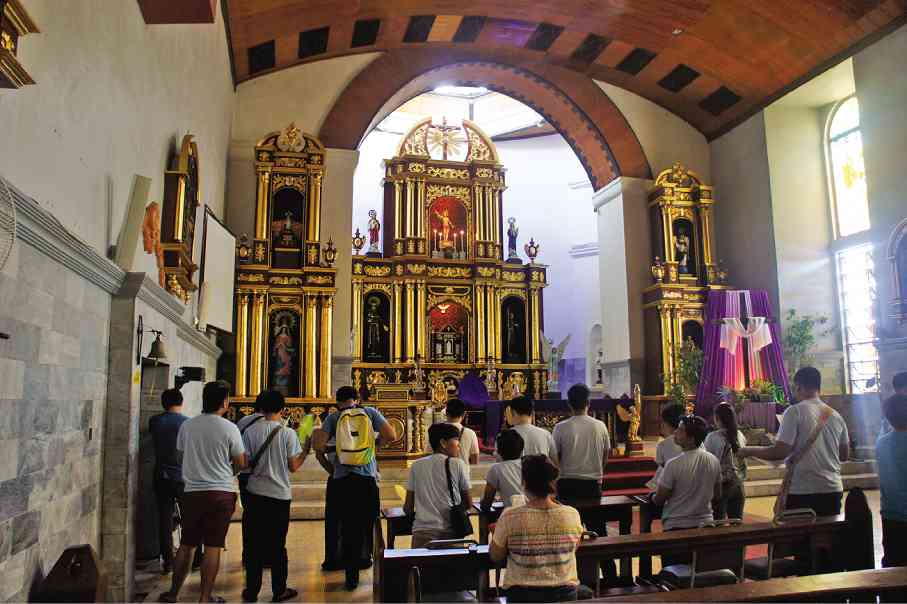
Young pilgrims pray before the altar of a Catholic church in Lumban, one of their Visita Iglesia (church visits) stops in Laguna province. VAUGHN ALVIAR
MANILA, Philippines — Cebu Archbishop Jose Palma reminded Catholics on Monday to reflect during the Holy Week, saying it entails more than going on vacation.
“’Yung Holy Week, Semana Santa, should be made ‘holy,’ Palma said over Radyo Inquirer.
The prelate noted that there were 52 weeks in a year and the Holy Week was the only one that delves on the mysteries of the faith.
READ: GOOD FRIDAY: Why did God have to die on the cross?
Palma said the occasion was not only for going on vacation but an opportunity to share in spiritual activities.
“Makiisa tayo sa ating mga panalangin, sa ating pagtipon-tipon, at sama-sama sa mga activities sa ating simbahan at sa ating mga komunidad,” he said.
Palma asked parents and the elderly to impart Holy Week traditions to the young and to urge them to observe Maundy Thursday and Good Friday with reverence.
“Maganda ‘yong ginagawa sa maraming pamilya na sabihin sa mga anak na sumasama tayo sa adoration of the cross. Pero sa Easter sumasa tayo magsaya. (Sa) iba, ‘yon na ang excursion,” he explained.
“Kung pwede, sa Biyernes Santo at Huwebes Santo ay ‘yung mga gawain muna sa simbahan. It’s a family event na sana ma-rediscover natin. Para din ito sa atin,” he said.
For Roman Catholics, the 40-day long Lenten season begins with Ash Wednesday. Holy Week, meanwhile, commences with Palm Sunday, a commemoration of Jesus Christ’s entry into Jerusalem during the Jews’ Passover festival.
Catholics commemorate Christ’s passion, crucifixion and death from Maundy Thursday, Good Friday, and Black Saturday. They celebrate His resurrection from the dead on Easter Sunday.
READ: EASTER: Did Jesus really rise from the dead?
“At the heart of the Holy Week is Jesus’ love for us,” the archbishop said.
He urged the faithful to use the time to be with Jesus.
“Sundan natin Siya. Sabayan natin Siya, at ito’y hahantong sa maraming activities – Good Friday – kahit sa Kanyang kamatayan, hanggang sa Kanyang muling pagkabuhay,” Palma noted.
The Catholic leader said young people could participate in a lot of activities that could enrich their faith like going to confession and attending recollections.
“Maganda ‘yong mga pabasa,” he said, noting that there were also the traditional processions, the commemoration of the Last Supper and Visita Iglesia on Maundy Thursday, and the Siete Palabras and Via Crucis on Good Friday.
Spaniards brought Catholicism to the Philippines in the 16th century and the Catholic Bishops Conference of the Philippines set the celebration of 500 years of Christianity in the Philippines in 2021.
According to the Philippine Statistics Authority (PSA), more than 80 percent of Filipinos identified themselves as Roman Catholic in 2015, making the Philippines the largest Catholic country in Southeast Asia. /cbb